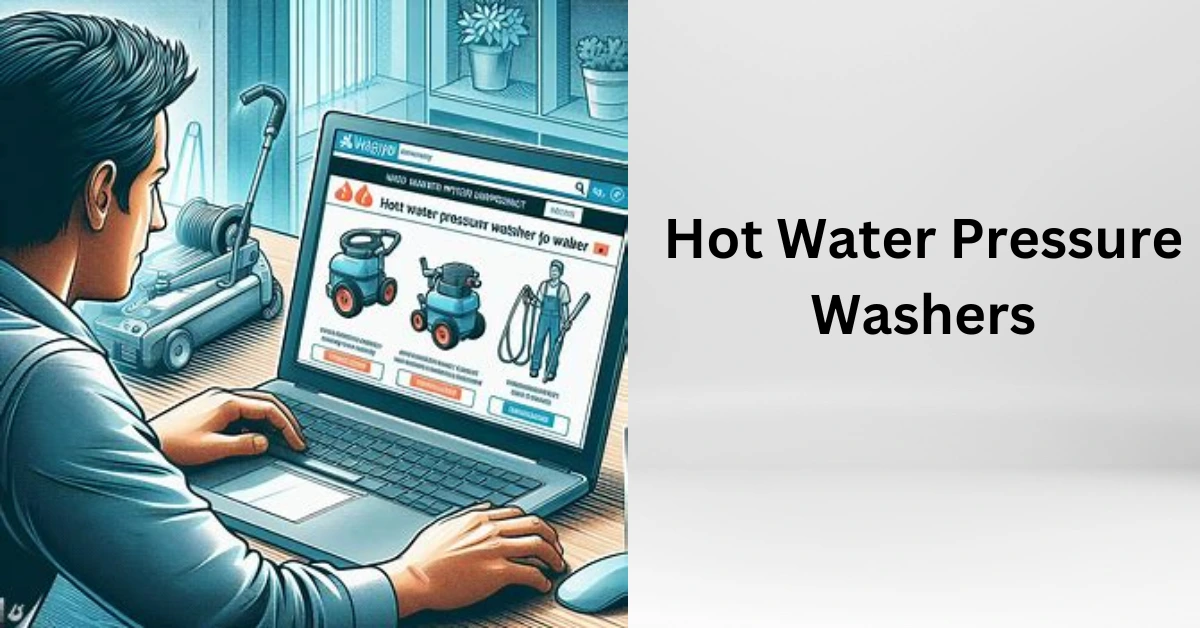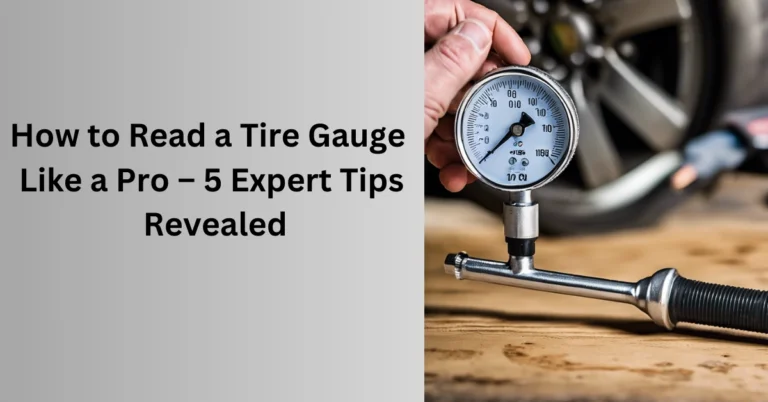Introduction
When it comes to cleaning, there’s a common misconception that water temperature doesn’t make a significant difference. However, in the world of pressure washing, the temperature of the water used can be a game-changer. Hot water pressure washers, often underestimated, have the potential to transform your cleaning tasks, making them more efficient and effective.
Whether you’re a homeowner looking to spruce up your property or a business owner seeking a powerful cleaning solution, read on to discover how hot water pressure washers can make a difference.
Table of Contents
Understanding Hot Water Pressure Washers
Hot water pressure washers, also known as high-temperature pressure washers, are designed to tackle tough cleaning jobs with the added advantage of heated water. Unlike their cold-water counterparts, hot water pressure washers can break down and dissolve stubborn grease, grime, and dirt more effectively. They operate on a simple principle – combining hot water with high-pressure spray to dislodge and wash away contaminants.
The Benefits of Hot Water
Let’s start by exploring the benefits of using hot water in pressure washing:
Enhanced Cleaning Power
Hot water can dissolve oil, grease, and other challenging substances that cold water might struggle to remove. This makes hot water pressure washers ideal for tasks like degreasing, which are common in industrial settings.Faster Cleaning
Hot water accelerates the cleaning process. It softens and loosens dirt and stains, reducing the time and effort required to clean surfaces. This can be especially advantageous for large-scale cleaning projects.Improved Sanitation
The high temperature of hot water also helps in killing bacteria and other microorganisms, ensuring a more hygienic cleaning outcome.Reduced Chemical Usage
Since hot water is effective at breaking down contaminants, you often need less chemical detergents when using hot water pressure washers, which is both cost-effective and eco-friendly.
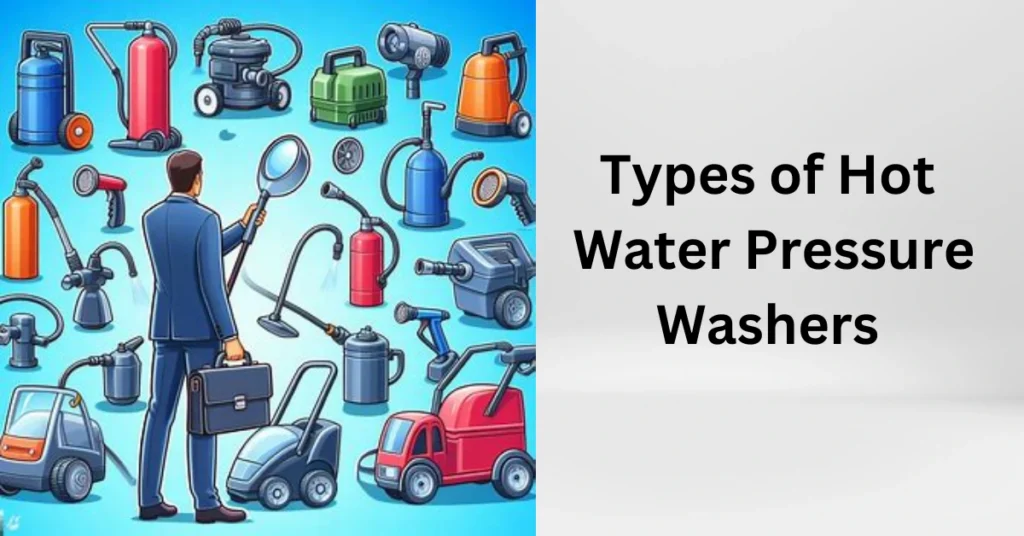
Types of Hot Water Pressure Washers
Hot water pressure washers come in two primary types: gas-powered and electric. Each type has its own set of advantages and considerations:
Gas-Powered Hot Water Pressure Washers
Advantages:
Portability:
Gas-powered models are not restricted by electrical cords, making them more versatile for outdoor use.High PSI:
They often have higher pressure ratings, suitable for heavy-duty cleaning tasks.Independent Power Source:
They don’t rely on electrical outlets, making them usable in remote locations.
Considerations:
Noise and Emissions:
Gas-powered models tend to be louder and produce exhaust emissions.Maintenance:
They require regular maintenance, including oil changes and fuel refills.
Electric Hot Water Pressure Washers
Advantages:
Quieter Operation:
Electric models are quieter and produce no emissions.Low Maintenance:
They are generally easier to maintain, with no need for fuel or oil changes.Environmental-Friendly:
They have a smaller carbon footprint.
Considerations:
Power Cord Limitation:
Electric pressure washers are limited by the length of the power cord, which may require an extension cord for large areas.Lower PSI:
They may have lower pressure ratings compared to gas-powered counterparts.
Factors to Consider When Choosing a Hot Water Pressure Washer
Now that you have a better understanding of the benefits and types of hot water pressure washers, it’s time to delve into the crucial factors to consider when selecting the right one for your specific needs. Making the right choice can significantly impact the efficiency and effectiveness of your cleaning tasks. Let’s explore these essential factors in detail:
Pressure (PSI) and Flow Rate (GPM)
The first and foremost consideration when choosing a hot water pressure washer is its pressure rating, measured in pounds per square inch (PSI), and its flow rate, measured in gallons per minute (GPM). These two factors determine the machine’s cleaning power. For most applications, a pressure washer with a PSI range of 2,000 to 3,000 and a GPM of 2 to 4 should suffice.
However, if you have heavy-duty cleaning tasks, such as removing thick layers of grease or paint, you may need a higher PSI and GPM.
Water Temperature
As the focus of our blog is hot water pressure washers, water temperature is a crucial consideration. These machines provide the added advantage of using hot water, which can be adjusted to suit your cleaning needs. The temperature range typically varies between 100°F to 330°F. For removing stubborn oil and grease, higher temperatures are more effective. However, always ensure that the materials you are cleaning can withstand the heat.
Fuel Type
If you opt for a gas-powered hot water pressure washer, consider the type of fuel it uses. Some models run on gasoline, while others use propane or diesel. Your choice should align with your availability of the chosen fuel source and your preference. Propane, for example, is often preferred for its clean-burning characteristics.
Portability and Mobility
Think about the mobility and portability of the pressure washer, especially if you have various locations to clean. Gas-powered models are typically more portable as they don’t rely on electrical outlets. Electric models, on the other hand, are limited by the length of their power cord, which may require an extension cord for larger areas.
Durability and Maintenance
Consider the durability and ease of maintenance of the pressure washer you intend to purchase. Look for models with durable components, such as brass fittings, stainless steel frames, and high-quality hoses. Regular maintenance, including oil changes for gas-powered models, is essential to ensure a long lifespan for your machine.
Noise Level
The noise level of a hot water pressure washer can vary significantly between gas-powered and electric models. Gas-powered machines tend to be louder due to their engines. If noise is a concern, particularly in residential areas, electric models provide quieter operation.
Environmental Impact
For eco-conscious consumers, evaluating the environmental impact of your choice is crucial. Electric hot water pressure washers are generally more environmentally friendly, producing no emissions and having a smaller carbon footprint. Gas-powered models emit exhaust emissions and are less eco-friendly.
Incorporate these factors into your decision-making process when choosing a hot water pressure washer. Understanding your specific cleaning needs and the advantages of each feature will help you make an informed choice that aligns with your goals.
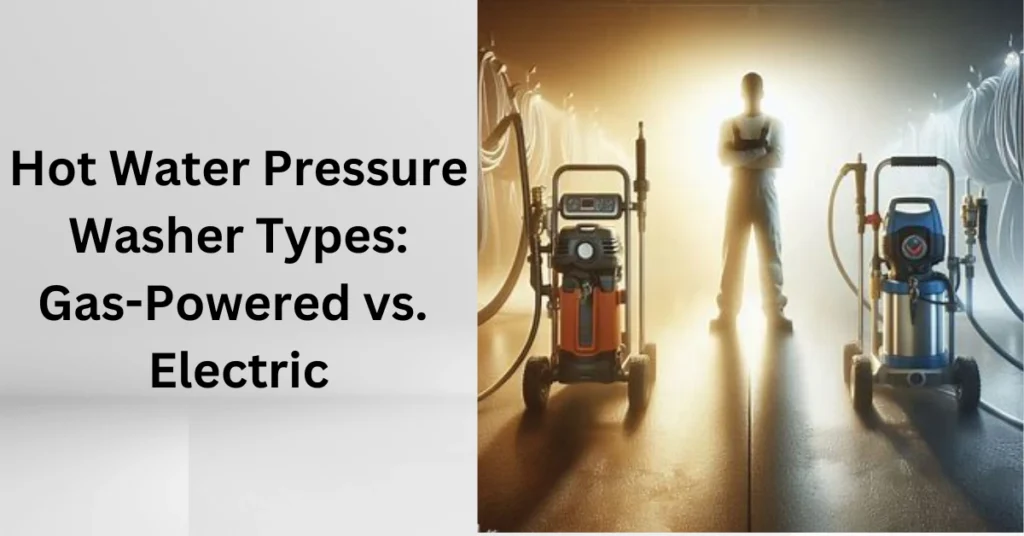
Hot Water Pressure Washer Types: Gas-Powered vs. Electric
Now that you have a solid understanding of the key factors to consider when choosing a hot water pressure washer, it’s time to explore the two primary types in more detail: gas-powered and electric. Both have their own set of advantages and considerations, so let’s delve into each type to help you make an informed decision:
Gas-Powered Hot Water Pressure Washers
Gas-powered hot water pressure washers are known for their robust performance and versatility. Here’s a closer look at what makes them a popular choice:
Advantages:
Portability:
Gas-powered models are highly portable as they don’t rely on electrical outlets. This freedom of movement makes them ideal for outdoor applications, such as cleaning driveways, decks, and fences.High PSI:
Gas-powered pressure washers often come with higher pressure ratings, making them suitable for heavy-duty cleaning tasks. If you need to remove stubborn grime, paint, or grease, a gas-powered unit can handle the job efficiently.Independent Power Source:
These machines have their engines, which means they don’t require access to electrical power sources. This independence allows you to use them in remote areas or locations without power outlets.
Considerations:
Noise and Emissions:
Gas-powered hot water pressure washers tend to be louder due to their internal combustion engines. Additionally, they produce exhaust emissions, which may not be suitable for environmentally sensitive areas or residential neighborhoods.Maintenance:
Regular maintenance is crucial for gas-powered models. This includes oil changes, fuel refills, and engine upkeep. If you’re not comfortable with maintenance tasks, electric models might be a more convenient option.
Electric Hot Water Pressure Washers
Electric hot water pressure washers are praised for their quieter operation and ease of use. Let’s explore their advantages and considerations:
Advantages:
Quieter Operation:
Electric models are noticeably quieter than their gas-powered counterparts, making them suitable for use in noise-sensitive environments or residential areas.Low Maintenance:
Electric hot water pressure washers are relatively low-maintenance. They don’t require fuel or oil changes, making them more convenient for users who want a hassle-free cleaning experience.Environmental-Friendly:
These machines produce no emissions, making them environmentally friendly. If you’re concerned about your carbon footprint, electric models are a sustainable choice.
Considerations:
Power Cord Limitation:
Electric pressure washers are limited by the length of their power cord. If you’re cleaning large areas, you may need to use an extension cord, which can affect their mobility.Lower PSI:
Electric models typically have lower pressure ratings compared to gas-powered units. While they are suitable for many cleaning tasks, they may not be as effective for extremely tough jobs.
Now that you have a comprehensive overview of gas-powered and electric hot water pressure washers, you can make a more informed decision based on your specific needs and preferences.
Hot Water Pressure Washer Maintenance Tips
Proper maintenance is the key to ensuring that your hot water pressure washer operates efficiently and has a long lifespan. In this section, we’ll provide you with valuable maintenance tips to keep your machine running smoothly and effectively. Let’s dive in:
Regular Inspection
Start by conducting routine visual inspections of your hot water pressure washer. Check for any visible signs of wear and tear, such as damaged hoses, loose fittings, or leaking seals. Identifying issues early can prevent more significant problems down the road.
Oil Changes (For Gas-Powered Models)
If you own a gas-powered hot water pressure washer, regular oil changes are essential to maintain the engine’s health. Consult your machine’s manual for the recommended oil change intervals and use the appropriate oil type. Be sure to dispose of used oil properly.
Fuel Management (For Gas-Powered Models)
Keep an eye on the fuel level and ensure that you’re using fresh, clean fuel. Stale fuel can lead to engine problems. If your machine has been sitting idle for an extended period, consider draining the fuel tank and carburetor to prevent issues related to old fuel.
Water Inlet Maintenance
Inspect the water inlet strainer or filter regularly and clean it if necessary. A clogged strainer can restrict water flow, affecting the performance of your pressure washer. Clean or replace the filter as recommended by the manufacturer.
Nozzle Inspection and Cleaning
Examine the spray nozzles for any obstructions or damage. Clean or replace them as needed to ensure a consistent and effective spray pattern. Properly functioning nozzles are essential for achieving the desired cleaning results.
Hose and Connection Checks
Check the hoses and connections for any signs of wear, leaks, or damage. Tighten any loose fittings and replace damaged hoses promptly. Properly secured hoses and connections are crucial for safety and optimal performance.
Pump Maintenance
If your pressure washer has a pump, be sure to follow the manufacturer’s instructions for pump maintenance. This may include lubrication, seal replacement, or winterizing procedures if applicable.
Storage Considerations
If you plan to store your hot water pressure washer for an extended period, take precautions to prevent damage. Drain the water from the pump, hoses, and gun. Store the machine in a dry, protected area to prevent freezing during cold seasons.
Professional Servicing
Consider scheduling periodic professional servicing for your pressure washer. Experienced technicians can perform in-depth inspections, diagnose hidden issues, and provide expert maintenance to keep your machine in top condition.
By following these maintenance tips, you’ll ensure that your hot water pressure washer remains reliable and efficient throughout its lifespan.
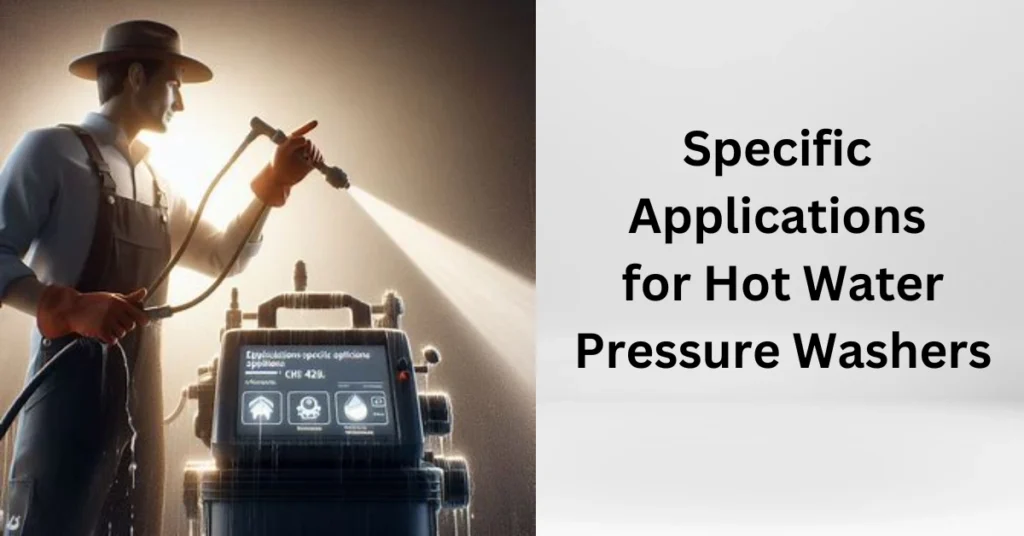
Specific Applications for Hot Water Pressure Washers
Hot water pressure washers are versatile tools that excel in a wide range of cleaning applications. In this section, we’ll explore specific scenarios where these machines can make a significant difference, helping you understand how to maximize their effectiveness:
Concrete Cleaning
Hot water pressure washers are ideal for cleaning concrete surfaces. Whether it’s your driveway, sidewalk, or patio, the combination of high-pressure hot water effectively removes dirt, stains, and even embedded grime. The hot water helps break down oil and grease, leaving your concrete surfaces looking clean and rejuvenated.
Removing Oil Stains
One of the toughest challenges in cleaning is removing oil stains from driveways or garage floors. Hot water pressure washers are highly effective in this regard. The hot water melts away the oil, and the high-pressure spray lifts it from the surface. This makes hot water pressure washers invaluable for auto shops and homeowners dealing with oil spills.
Restaurant Kitchen Cleaning
Maintaining a clean and sanitary kitchen is essential in the foodservice industry. Hot water pressure washers are commonly used to clean commercial kitchen equipment, hoods, and floors. The hot water not only removes grease and grime but also helps disinfect surfaces, ensuring a safe food preparation environment.
Fleet Maintenance
Businesses with vehicle fleets can benefit greatly from hot water pressure washers. These machines efficiently clean trucks, buses, and other vehicles, removing dirt, road grime, and contaminants. Hot water is particularly effective at cleaning the exteriors of vehicles, making them look well-maintained and professional.
Graffiti Removal
Hot water pressure washers are excellent tools for removing graffiti from various surfaces, including walls, signs, and public spaces. The combination of high pressure and hot water helps break down and wash away the paint, restoring surfaces to their original condition. This is especially valuable for municipalities and property owners dealing with graffiti vandalism.
Industrial Cleaning
In industrial settings, hot water pressure washers are essential for cleaning heavy machinery, equipment, and factory floors. The high-temperature water effectively cuts through grease, oil, and industrial residues, maintaining a safe and efficient workspace.
Agricultural Equipment Cleaning
Farmers and agricultural businesses use hot water pressure washers to clean tractors, harvesters, and other equipment. The hot water removes mud, soil, and plant residues, helping to prevent the spread of pests and diseases while extending the life of the machinery.
Construction Site Cleanup
Construction sites can become littered with debris, dust, and construction materials. Hot water pressure washers are valuable for cleaning construction equipment, scaffolding, and even the building itself. They help ensure a safe and tidy worksite.
Vehicle Detailing
Hot water pressure washers are used in the auto detailing industry to clean vehicles thoroughly. The combination of hot water and high pressure removes dirt, grime, and even stubborn stains, leaving vehicles looking pristine and well-maintained.
Incorporating hot water pressure washers into these specific applications can significantly improve the efficiency and effectiveness of cleaning tasks.
Case Studies: Real-Life Success with Hot Water Pressure Washers
To further emphasize the effectiveness of hot water pressure washers, let’s dive into real-life case studies where businesses and individuals have achieved remarkable results using these powerful cleaning machines. These stories serve as compelling examples of how hot water pressure washers can make a significant impact in various cleaning scenarios.
Restaurant Kitchen Transformation
Problem:
A busy restaurant kitchen was struggling to maintain a clean and hygienic environment due to grease buildup on kitchen equipment and floors.
Solution:
The restaurant invested in a hot water pressure washer with specialized nozzles designed for kitchen cleaning. The hot water effectively dissolved the grease, while the high-pressure spray removed stubborn residues. The result was a kitchen that not only looked spotless but also met the highest hygiene standards.
Graffiti Eradication Efforts
Problem:
A city park faced recurring graffiti vandalism on its playground equipment and public restroom walls, leading to concerns about public safety and aesthetics.
Solution:
The city decided to use hot water pressure washers for graffiti removal. The combination of high-pressure hot water effectively removed the graffiti without causing damage to the underlying surfaces. This proactive approach reduced vandalism incidents and improved the overall appearance of the park.
Fleet Maintenance Efficiency
Problem:
A transportation company with a large vehicle fleet was struggling to keep its trucks clean and presentable, impacting its corporate image.
Solution:
The company integrated hot water pressure washers into its maintenance routine. Regular cleaning sessions using hot water pressure washers not only improved the appearance of the vehicles but also extended their lifespan by removing corrosive road salts and debris. The fleet now stands out as well-maintained and professional on the road.
Farm Equipment Revitalization
Problem:
A farm owner faced challenges cleaning heavy machinery and tractors after long days of work in the fields, resulting in wear and tear on the equipment.
Solution:
The farm owner invested in a hot water pressure washer to streamline equipment cleaning. The hot water effectively removed mud and plant residues, preventing corrosion and maintaining the machinery in top condition. This investment led to increased equipment lifespan and reduced repair costs.
Commercial Property Restoration
Problem:
A commercial property owner had several buildings marred by years of dirt, grime, and pollution, affecting the overall appeal of the property.
Solution:
Hot water pressure washers were used to restore the exterior surfaces of the buildings. The hot water removed years of buildup, revealing the original appearance of the structures. This transformation not only increased the property’s curb appeal but also attracted new tenants and customers.
These case studies highlight the diverse applications and positive outcomes achieved by incorporating hot water pressure washers into various cleaning routines.
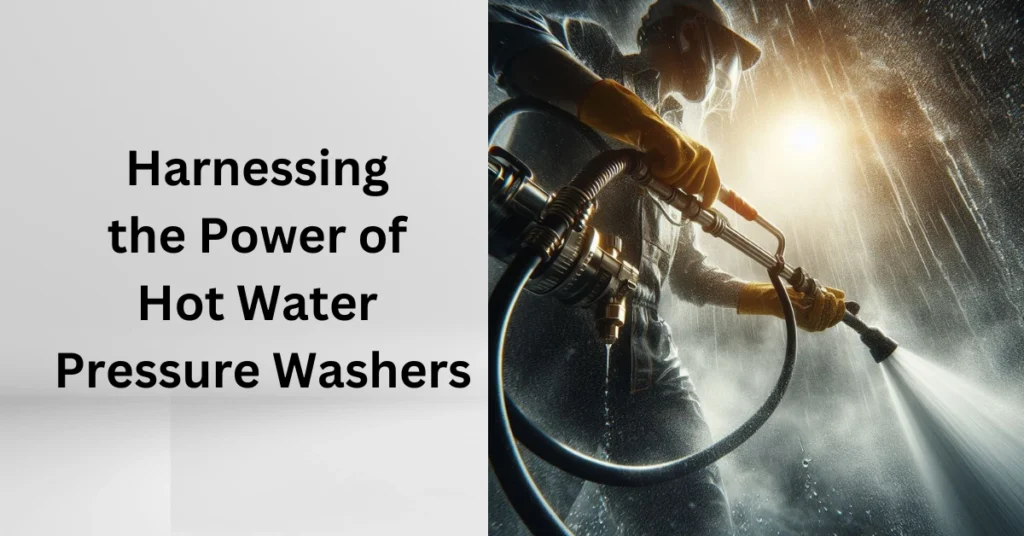
Conclusion: Harnessing the Power of Hot Water Pressure Washers
As we reach the conclusion of our exploration into the world of hot water pressure washers, it’s essential to recap the key takeaways and provide guidance for those considering these powerful cleaning machines. Whether you’re a homeowner, business owner, or industry professional, hot water pressure washers offer numerous benefits that can elevate your cleaning efforts. Let’s summarize what we’ve learned:
Enhanced Cleaning Power
Hot water pressure washers offer enhanced cleaning power compared to their cold-water counterparts. The hot water effectively dissolves grease, oil, and stubborn stains, making them invaluable for a wide range of cleaning tasks.
Versatility in Applications
From restaurant kitchens to fleet maintenance, graffiti removal to farm equipment cleaning, hot water pressure washers excel in diverse cleaning applications. Their versatility makes them a valuable asset in various settings.
Gas-Powered vs. Electric Models
Consider your specific needs and preferences when choosing between gas-powered and electric hot water pressure washers. Gas-powered models offer portability and high PSI, while electric models provide quieter operation and ease of use.
Regular Maintenance
Proper maintenance is key to the longevity and efficiency of your hot water pressure washer. Regularly inspect, clean, and service your machine to ensure it operates optimally.
Real-Life Success Stories
Real-life case studies illustrate how hot water pressure washers have transformed businesses and properties. These stories showcase the tangible benefits and positive outcomes achieved through the use of these machines.
In conclusion, hot water pressure washers are powerful tools that can revolutionize your cleaning routine, whether you’re aiming to maintain a clean and hygienic kitchen, restore the appearance of a commercial property, or extend the lifespan of your valuable equipment.
By understanding the advantages, applications, and maintenance requirements, you can harness the full potential of these versatile machines.
For more information please visit insightfullhome.com.
Frequently asked questions about hot water pressure washers
These FAQs provide valuable information for those considering the use of hot water pressure washers, addressing common concerns and highlighting the advantages of these powerful cleaning machines.
Question 1. What is the difference between hot water and cold water pressure washers?
Hot water pressure washers use heated water, which is more effective at dissolving grease and grime, while cold water pressure washers rely solely on water pressure for cleaning.
Question 2. Are hot water pressure washers suitable for home use?
Yes, hot water pressure washers are suitable for homeowners looking to tackle tough cleaning tasks like removing oil stains from driveways, cleaning decks, and rejuvenating outdoor surfaces.
Question 3. How do I choose between a gas-powered and an electric hot water pressure washer?
Consider your specific needs and location. Gas-powered models offer portability and high PSI, while electric models provide quieter operation and ease of use.
Question 4. Can hot water pressure washers damage surfaces?
When used correctly, hot water pressure washers are unlikely to damage surfaces. However, it’s essential to adjust the pressure and temperature settings according to the material you’re cleaning.
Question 5. What maintenance is required for a hot water pressure washer?
Regular maintenance includes visual inspections, oil changes (for gas-powered models), checking hoses and connections, and cleaning or replacing nozzles and filters.
Question 6. Are hot water pressure washers eco-friendly?
Electric hot water pressure washers are more environmentally friendly as they produce no emissions. Gas-powered models emit exhaust emissions but can be used efficiently with proper maintenance.
Question 7. Can hot water pressure washers remove graffiti effectively?
Yes, hot water pressure washers are highly effective at removing graffiti. The combination of high-pressure hot water can dissolve and remove graffiti paint without causing damage to the underlying surface.
Question 8. What safety precautions should I take when using a hot water pressure washer?
Always wear appropriate protective gear, follow the manufacturer’s instructions, and be cautious when handling hot water and high-pressure spray to prevent accidents.
Question 9. How do hot water pressure washers benefit businesses like restaurants?
Hot water pressure washers are crucial for maintaining clean and hygienic kitchen environments by effectively removing grease and grime, ensuring food safety and compliance with health regulations.
Question 10. Can hot water pressure washers be used for agricultural equipment cleaning?
Yes, hot water pressure washers are excellent for cleaning farm equipment. They remove mud, soil, and residues, preventing the spread of pests and diseases and extending the equipment’s lifespan.
Have a nice day!

